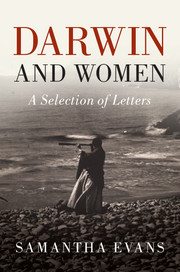Book contents
- Frontmatter
- Contents
- List of illustrations
- Foreword
- Preface
- Acknowledgments
- Symbols, abbreviations, and conventions
- 1 Friends
- 2 Marriage
- 3 Children
- 4 Scientific wives and allies
- 5 Observing plants
- 6 Companion animals
- 7 Insects and angels
- 8 Observing humans
- 9 Editors
- 10 Writers and critics
- 11 Religion
- 12 Travellers
- 13 Servants and governesses
- 14 Ascent of woman
- List of letters and provenances
- Biographical notes
- Bibliography and further reading
- Index
12 - Travellers
Published online by Cambridge University Press: 16 February 2017
- Frontmatter
- Contents
- List of illustrations
- Foreword
- Preface
- Acknowledgments
- Symbols, abbreviations, and conventions
- 1 Friends
- 2 Marriage
- 3 Children
- 4 Scientific wives and allies
- 5 Observing plants
- 6 Companion animals
- 7 Insects and angels
- 8 Observing humans
- 9 Editors
- 10 Writers and critics
- 11 Religion
- 12 Travellers
- 13 Servants and governesses
- 14 Ascent of woman
- List of letters and provenances
- Biographical notes
- Bibliography and further reading
- Index
Summary
Darwin's female friends, relations, and correspondents didn't tend to mount scientific expeditions of the sort that led men to write to Darwin for advice; nevertheless, in the quest for health, accompanying husbands to foreign postings, or decamping with their families to new homes abroad, they did travel, and sent back their impressions.
The female traveller who was closest to home was Henrietta. After suffering a great deal of illness in her youth, Henrietta recovered enough to take several trips to Europe. Emma worried, ‘I only hope you may not turn into a regular travelling old maid living abroad’ (DAR 219.9 73). She wrote long letters home (‘I find it decidedly trying to read yr descriptions’, wrote her forthright friend, Elinor Bonham Carter). She always travelled in company with a friend or a relation, staying at guest-houses patronised by other English people, and at a pinch a brother or servant could be dispatched to Paris or Calais to bring her home if the party broke up leaving her unchaparoned. Nevertheless, by 1870 she declared to Emma, ‘an idiot cd travel alone in France’ (DAR 245: 40). In 1866, she was travelling in France with Elinor, who had been unwell and wanted to go abroad. In this letter of 4 June, she describes a train wreck near Arles to Emma.
E. got better after Marseilles—19 o'clock where we had some hasty food—we managed to tip a porter & induced him to keep our carriage free so we made up our beds told the guard to wake us at Avignon & settled off to doze away the 3 hours—2 of them passed away in semi sleep & I believe I was just going right off when I started up feeling that we were off the line—tearing along & shaking us a good deal though not enough to knock us off our seats—Elinor thought of the bank at the side—I where to sit where I shd have the least chance of death—but bfore we had time for much thought, the train was stopped—450 steps a little soldier told Elinor it was. I shd hardly have thought it was so much— Happily for us the engine diverged to the right— …
- Type
- Chapter
- Information
- Darwin and WomenA Selection of Letters, pp. 183 - 193Publisher: Cambridge University PressPrint publication year: 2017

